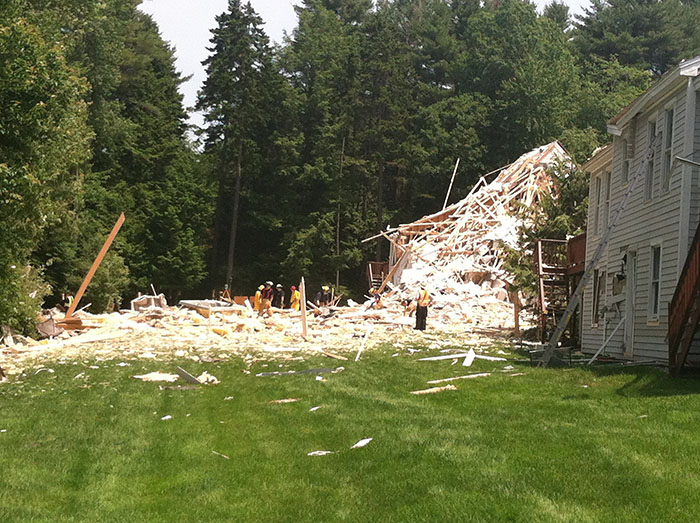Tuesday’s explosion in Yarmouth, believed to have been caused by a propane leak in a condominium unit, shows the importance of getting home heating systems inspected, said state officials and a leader in the propane industry, because no state has an effective system to require regular inspections.
“Certainly, it’s prudent and wise for a homeowner with any sort of heating system to have it serviced and maintained,” said Doug Dunbar, spokesman for the state Department of Professional and Financial Regulation. “But there is not a requirement in Maine law.”
The only systematic inspections of propane-powered systems in Maine are done by the state Public Utilities Commission, which inspects systems that serve more than 10 customers from a single source, said Derek Davidson, director of the PUC’s Consumer Assistance Division.
Maine has 792 registered propane systems that require inspections by the PUC, Davidson said. Last year, the commission inspected 225 of them.
“We have set an internal objective of inspecting every registered facility in the state at least once every five years,” he said, but that interval is not in state law.
The 14-unit North Gables condominium complex in Yarmouth, where the explosion occurred, does not fall under the PUC’s requirement. Three underground propane tanks serve four units each, and an additional tank supplies fuel to two units, according to the property manager.
None of the tanks failed or exploded Tuesday.
Inspections are offered by companies that sell propane, but it’s up to property owners to request and pay for them, said Joe Rose, president and CEO of the Propane Gas Association of New England.
“Many propane companies, as a business model, send notifications encouraging people to have their systems inspected on an annual or biannual basis,” Rose said. “Some companies just sell the propane and offer emergency service.”
In New England, only Vermont requires homeowners with propane-fueled heating systems to have the equipment inspected, every two years.
Even there, Rose said, enforcement is inconsistent and unwieldy, with responsibility falling to local governments that may not have enough funding to employ a full staff of inspectors.
“Other states have not adopted similar regulations because they wouldn’t have the manpower to enforce them,” Rose said. “If you said someone has to inspect half the propane-heated homes in New England on an annual basis, cities and towns would never be able to afford the inspectors.”
Maine has no statewide system to track home heating systems that are inspected by private companies, or any way to track whether technicians correct every major problem they find, even if a homeowner is reluctant to spend the money.
“Our experience indicates that (homeowners) almost always take some action if there are serious concerns,” said Dunbar.
Sometimes, in case of serious problems, a technician will shut a system down or contact the local code enforcement agency or fire department he said.
“Technicians understand the importance of their work,” Dunbar said.
In the six New England states, the technicians who install or work on propane systems are subject to the most scrutiny.
Technicians in Maine have been required to have licenses since 1995, said Dunbar, whose department licenses technicians, holds recertification programs and disciplines licensees who are not in compliance.
The department employs four inspectors, Dunbar said, but they are not dedicated solely to propane issues, and generally act on tips or complaints.
Once a propane system is installed, the property owner is responsible for ensuring that the furnace, water heater or fireplace is maintained properly, he said.
Send questions/comments to the editors.



